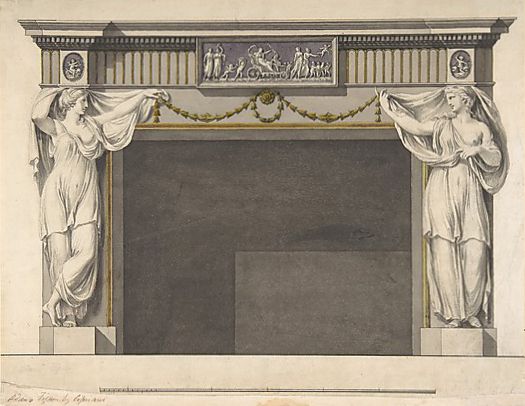
Design for a Chimney Piece, Harewood House, Yorkshire
Robert Adam: British, Kirclady, Scotland 1728–1792
Date: ca. 1769
Below is an excerpt on symmetry from Civilization by Kenneth Clark:
Clark writes about symmetry:
P. 293
The reasonable world of an eighteenth-century library is symmetrical, consistent and enclosed. Symmetry is a human concept, because with all our irregularities we are more or less symmetrical and the balance of a mantelpiece by Adam or a phrase by Mozart reflects our satisfaction with our two eyes, two arms and two legs. And consistency: again and again in this series I have used that word as a term of praise. But enclosed! That's the trouble: an enclosed world becomes a prison of the spirit. One longs to get out, one longs to move. One realises that symmetry and consistency, whatever their merits, are enemies of movement. And what is that I hear - that note of urgency, of indignation, of spiritual hunger. Beethoven. The sound of European man once more reaching for something beyond his grasp. We must leave the trim, finite interiors of eighteenth-century classicism and go to confront the infinite. We have a long, rough voyage ahead of us, and I cannot say where it will end, because it is not over yet. We are still the offspring of the Romantic movement, and still victims of the Fallacies of Hope.And he continues that this restraint, this symmetry, was what the Romantics wanted to escape from:
I have used the metaphor of the sea because all the great Romantics, from Byron onwards, have been obsessed by this image of movement and escape.It is as though Mozart was at the cusp of this desire to move, to escape, to gallop (as I write here) from the confines of symmetry.
Once more upon the waters! yet once more!
And the waves bound beneath me as a steed
That knows his rider. Welcome to their roar!
Swift be their guidance, wheresoe'er it lead!
In Romantic art it usually led to disaster. The escape from symmetry was also an escape from reason. The eighteenth-century philosophers had attempted to tidy up human society by the use of reason. But rational arguments were not strong enough to upset the huge mass of torpid tradition that had grown up in the last hundred and fifty years.
Here is what I wrote about Mozart, and how he manages to rein in his music, despite the urgency:
[H]e never leads us far from the origin, and never teases us too much, although he loves to tease.Still, Clark's Beethoven is a consequence of this desire to move, to escape, to gallop off. It is a dangerous desire, which leaves us groundless and always shifting, and open to attacks from all corners, spiritual and earthly.
-------------------------------------------------------------------------------------------------------------------------------------------------------------
Posted By: Kidist P. Asrat
